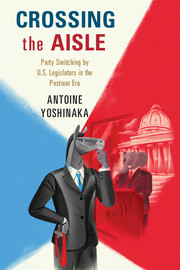Book contents
- Frontmatter
- Dedication
- Contents
- List of Tables
- List of Figures
- Acknowledgments
- PART I
- PART II
- PART III
- 5 The Electoral Consequences of Party Switching among Members of Congress
- 6 The Benefits of Party Switching: Intrainstitutional Advancement and the Committee Assignment Process
- PART IV
- Appendix A Excluded “Pseudo-Switchers”
- Appendix B Details about Elite Interviews
- Appendix C Data Sources for Chapter 3
- Appendix D Data Sources for Chapter 4
- Appendix E Data Sources for Chapter 5
- Appendix F Data Sources for Chapter 6
- References
- Index
5 - The Electoral Consequences of Party Switching among Members of Congress
from PART III
Published online by Cambridge University Press: 05 December 2015
- Frontmatter
- Dedication
- Contents
- List of Tables
- List of Figures
- Acknowledgments
- PART I
- PART II
- PART III
- 5 The Electoral Consequences of Party Switching among Members of Congress
- 6 The Benefits of Party Switching: Intrainstitutional Advancement and the Committee Assignment Process
- PART IV
- Appendix A Excluded “Pseudo-Switchers”
- Appendix B Details about Elite Interviews
- Appendix C Data Sources for Chapter 3
- Appendix D Data Sources for Chapter 4
- Appendix E Data Sources for Chapter 5
- Appendix F Data Sources for Chapter 6
- References
- Index
Summary
America needs leadership and not flip-floppers.
– Madison County Commissioner Mo BrooksI think [changing parties] may have been, politically, a mistake.
– Representative Parker Griffith after losing to Mo Brooks in the Republican primaryMike Forbes is pro-life, pro-impeachment, pro-assault weapon, pro-Bush…. My phone has practically melted the past few days from Suffolk County Democrats calling to say, “My God. I'm not going to work for this guy. I'm not going to vote for him.”… How can he stand there next to Mrs. Clinton … with his George W. Bush pin and his pro-life record?
– Tony Bullock, chief of staff of U.S. Senator Daniel Patrick Moynihan, after U.S. Representative Michael Forbes’ switch to the Democratic Party in 1999What are the consequences of party switching for incumbent legislators? Having shown the conditions under which they are more likely to switch parties, I devote the next two chapters to the electoral and institutional ramifications of party switching. These chapters are the next steps in our quest to understand the causes and consequences of legislative party switching, and I make two points in them: (a) party switching entails significant electoral costs, and (b) party leaders reward party switchers with institutional currency through the committee assignment process.
The purpose of these next two chapters is to provide empirical evidence of (electoral) costs and (institutional) benefits that are consistent with the theoretical framework I presented in Chapter 2 that centered on the costs of party switching. While the theoretical discussion and the interview evidence from that chapter suggest that these costs are real and significant and that legislators are aware of them, the question remains whether party switchers systematically incur significant costs at the ballot box. This is a critical question because the absence of electoral costs would undercut the theory, while the presence of these costs would bolster my theoretical argument. I answer this question by examining the electoral consequences of party switching with data from primary and general election contests in both the U.S. House and Senate. In order to find evidence in support of the assumption that party switching is costly, I conduct two sets of analyses: within-career analyses on party switchers only and cross-sectional analyses comparing the electoral fate of party switchers to that of a sample of nonswitchers.
- Type
- Chapter
- Information
- Crossing the AisleParty Switching by US Legislators in the Postwar Era, pp. 109 - 141Publisher: Cambridge University PressPrint publication year: 2015



